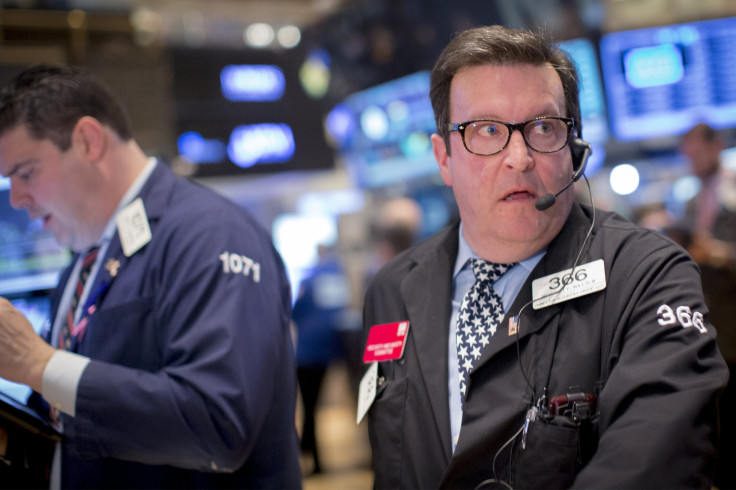Dow Jones Industrial Average Plunges 275 Points As Strong Dollar Spooks Investors

U.S. stocks tumbled Friday, with the Dow Jones Industrial Average plunging 275 points as investors grappled with the strengthening dollar's drag on corporate profits during earnings season. Meanwhile, a regulatory crackdown on trading in China, coupled with renewed concerns about the Greece debt crisis, also weighed on the global markets Friday.
Separately, traders faced challenges following an overnight outage on Bloomberg financial terminals in Asia and Europe.
In morning trading Friday, the Dow (INDEXDJX:.DJI) plunged 274.23 points, or 1.51 percent, to 17,822.37. The Standard & Poor's 500 (INDEXNASDAQ:.IXIC) dropped 25.05 points, or 1.19 percent, to 2,079.74. The Nasdaq composite (INDEXSP:.INX) fell 79.24 points, or 1.58 percent, to 4,928.55.
Investors are becoming more concerned about corporate earnings as many companies report revenue shortfalls, including big names from the industrial sector, such as General Electric Company and Honeywell International Inc., as well as financial services giant American Express Company.
A stronger U.S. dollar isn't good news for American corporate bottom lines. A prolonged period of dollar strengthening would hurt U.S. multinational corporations once they convert foreign revenue to dollars, slowing earnings growth.
The robust dollar is a huge drag on growth for the benchmark S&P 500 because the index’s companies derive more than 40 percent of their revenue overseas. “As more and more multinational corporations begin to report revenue shortfalls, the U.S. dollar effect is going to become more pronounced, and that’s a worry for the market,” said Peter Cardillo, chief market economist at Rockwell Global Capital.
The U.S. dollar index, which measures the greenback against major world currencies, has gained around 13 percent since last June.
Shares of Honeywell (NYSE:HON) dropped more than 2 percent Friday after the company slashed its outlook for 2015 and turned in a 5 percent drop in first-quarter revenue, due to the strong dollar.
Meanwhile, General Electric (NYSE:GE) said its quarterly profit jumped 9 percent, but revenue fell 1 percent, also weighed down by the greenback. Shares of the multinational conglomerate edged up 0.4 percent Friday to $27.40.
A strong dollar also drove down revenue for Dow component American Express (NYSE:AXP), which dropped more than 5 percent Friday to $76.79. The multinational financial services corporation cited "significant impact" from a stronger U.S. dollar on its international business after revenue came in at $7.95 billion, lower than $8.2 billion a year earlier.
Two other factors contributed to the market's decline Friday, Cardillo said, including tensions about a possible Greek default and a regulatory crackdown on trading in China.
Greece will need to use all the remaining cash reserves across its public sector, a total of 2 billion euros ($2.16 billion), to pay civil service wages and pensions at the end of the month, Reuters reported in an exclusive interview Friday. "This is the last bit of cash that the Greek state has," a senior finance ministry official told Reuters.
Meanwhile, China’s regulators tightened rules on margin lending Friday, cracking down on over-the-counter margin trading and regulations that allow fund managers to lend shares for short-selling.
However, inflation and consumer sentiment data coming out of the U.S. were stronger than expected. U.S. consumer prices rose for a second straight month in March as gasoline prices rose, showing some signs that inflation is ticking up, which could keep the Federal Reserve on course to begin lifting interest rates this year. The Core Consumer Price Index, which excludes food and energy, came in slightly above expectations at 0.2 percent, the same level as in February.
Separately, consumer confidence soared to its second-highest level since 2007 as Americans were more upbeat about the economy and their current financial situations. The University of Michigan said Friday its preliminary index of sentiment climbed to 95.9 this month, from 93 in March.
© Copyright IBTimes 2025. All rights reserved.






















